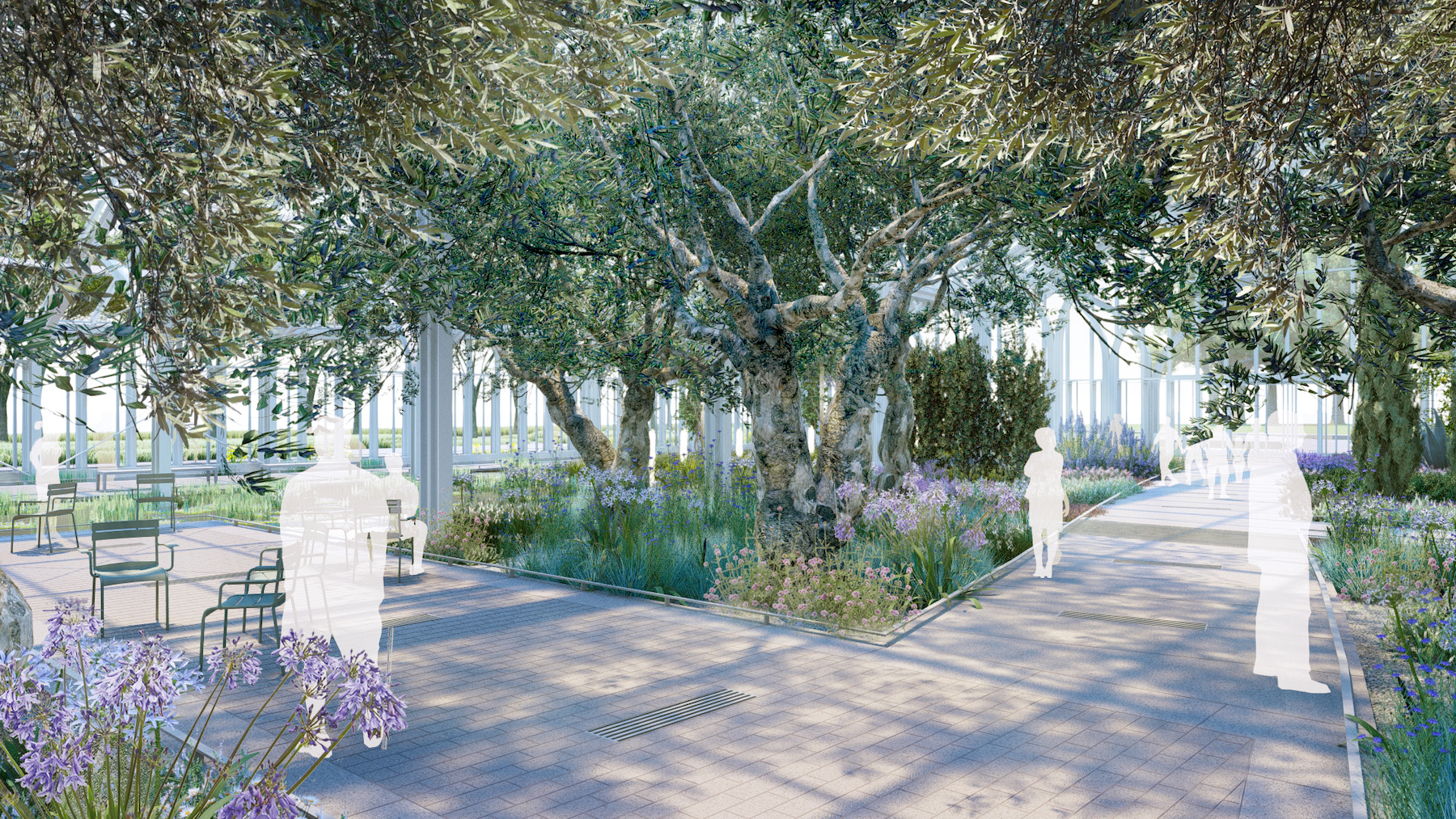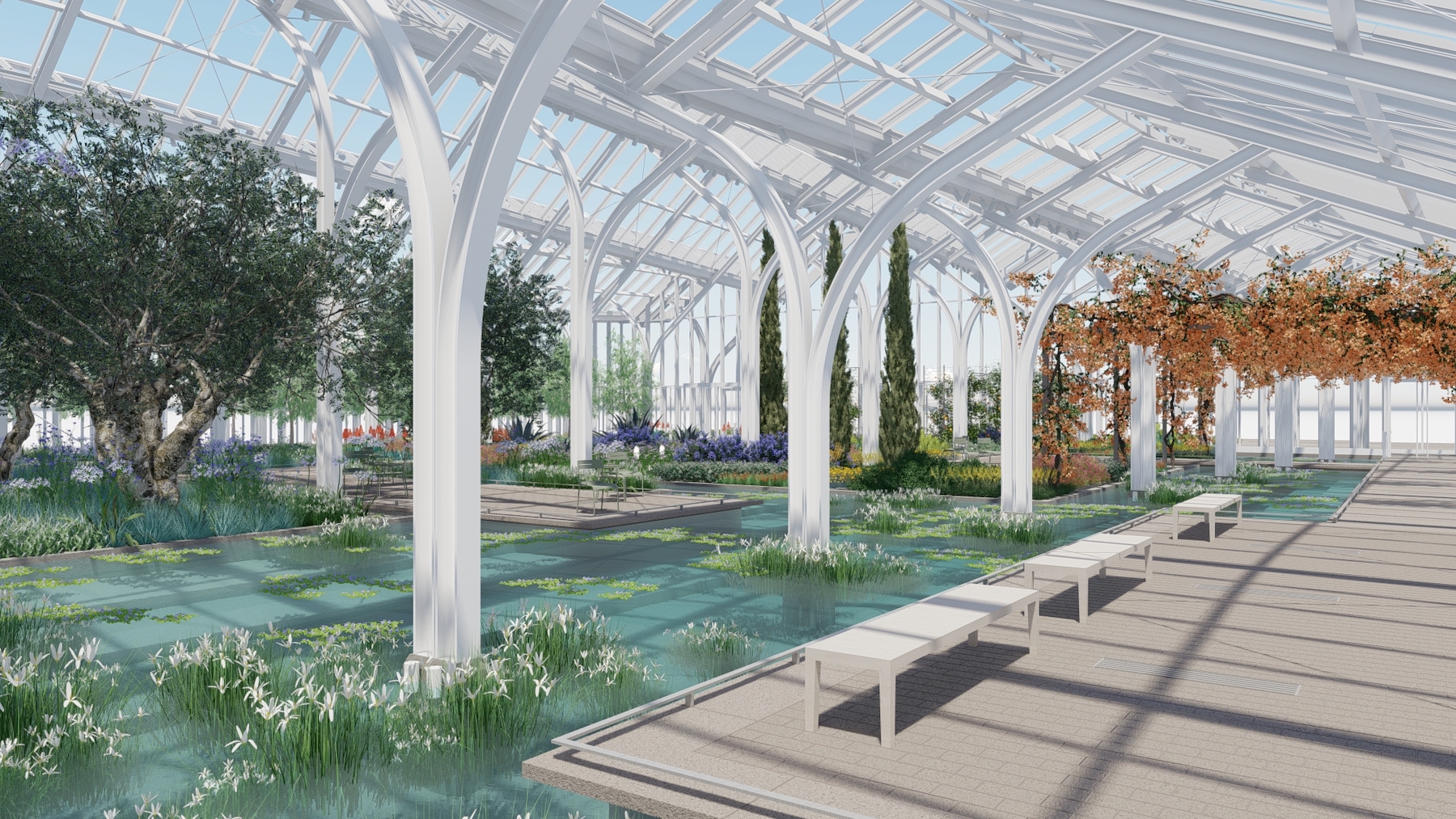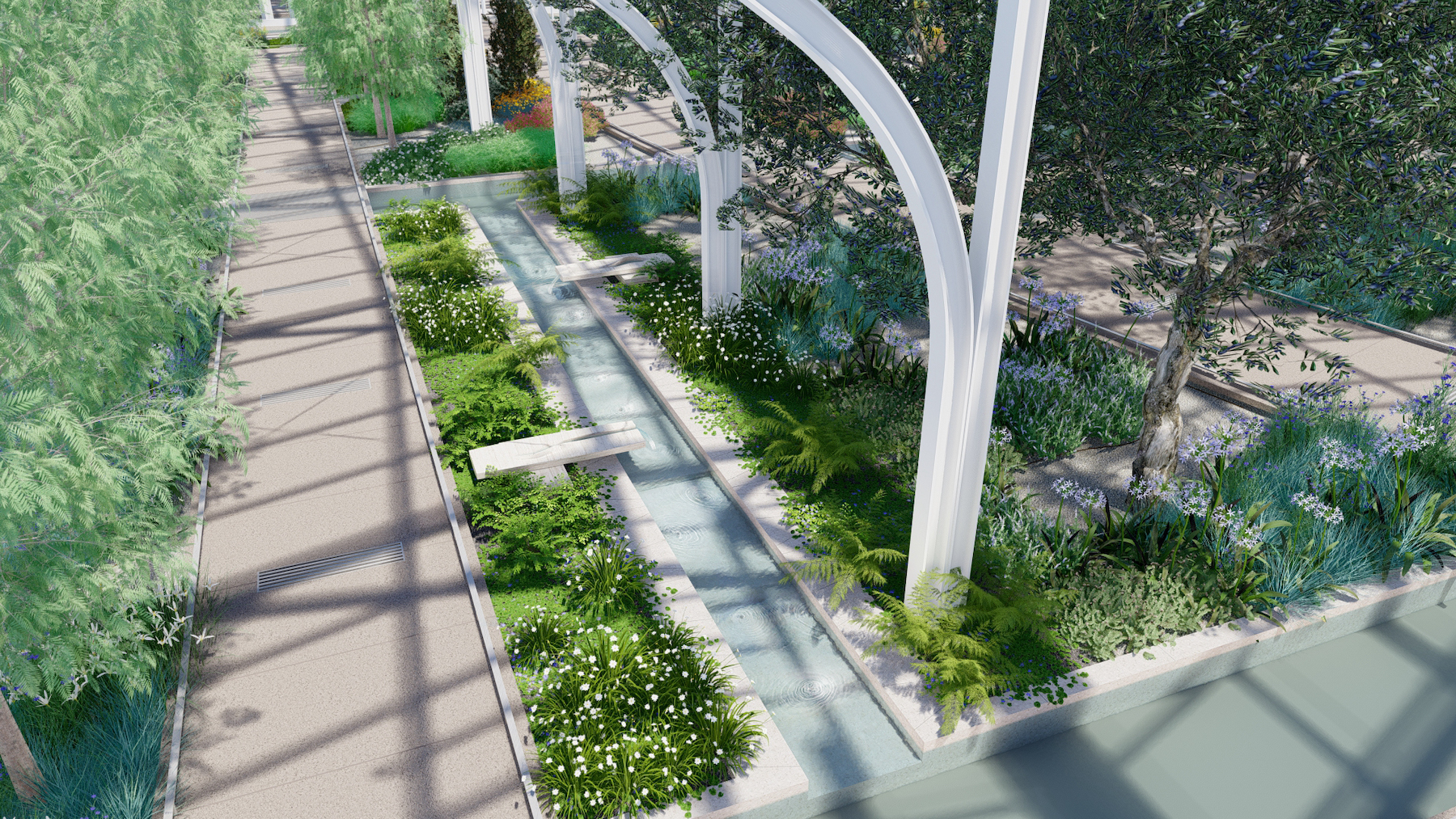Longwood Gardens, a botanical garden with about 1,100 acres in Pennsylvania’s Brandywine Valley, recently announced plans to transform its core area of conservatory gardens. Across 17 acres, the $250 million project will include expanded gardens and public spaces as well as new buildings.
Dubbed Longwood Reimagined: A New Garden Experience, the project originated with a master plan developed in 2010 by West 8 with Weiss/Manfredi. Longwood has continued working with Weiss/Manfredi as lead designer, in collaboration with Reed Hilderbrand, on Longwood Reimagined. The project is managed by Bancroft Construction.
The centerpiece and largest element of Longwood Reimagined is a new 32,000-square-foot glasshouse, designed by Weiss/Manfredi, with gardens and pools designed by Reed Hilderbrand. With asymmetrical peaks, the West Conservatory will seem to float on water. Inside, the garden will comprise seasonally changing islands amid pools, canals, and low fountains. Building on the 19th-century tradition of glasshouses, the West Conservatory will include operable glass walls and roof.
Longwood’s Cascade Garden is being entirely relocated to a new, 3,800-square-foot glasshouse of its own. An outdoor Bonsai Courtyard will be built alongside the West Conservatory. A public restaurant and private event space will be carved into the topography facing the Main Fountain Garden. And above the restaurant and event space, the South Terrace and South Walk will provide a shady promenade extending along the conservatories to the West Terrace, with views toward the Brandywine’s meadows.
Other elements of the Longwood Reimagined project include the construction of an education and administration building with a library and classrooms, the renewal of the Waterlily Court, and the relocation and preservation of six historic Lord & Burnham glasshouses from the early 20th century.
Building Team:
Owner: Longwood Gardens
Design architect: Weiss/Manfredi, Reed Hilderbrand (landscape)
Architect of record: Weiss/Manfredi
MEP engineer: Jaros, Baum & Bolles
Structural engineer: Magnusson Klemencic Associates
General contractor/construction manager: Bancroft Construction



Related Stories
| Aug 11, 2010
The pride of Pasadena
As a shining symbol of civic pride in Los Angeles County, Pasadena City Hall stood as the stately centerpiece of Pasadena's Civic Center since 1927. To the casual observer, the rectangular edifice, designed by San Francisco Classicists John Bakewell, Jr., and Arthur Brown, Jr., appeared to be aging gracefully.
| Aug 11, 2010
9 Rooftop Photovoltaic Installation Tips
The popularity of rooftop photovoltaic (PV) panels has exploded during the past decade as Building Teams look to maximize building energy efficiency, implement renewable energy measures, and achieve green building certification for their projects. However, installing rooftop PV systems—rack-mounted, roof-bearing, or fully integrated systems—requires careful consideration to avoid d...
| Aug 11, 2010
Education's Big Upgrade
Forty-five percent of the country's elementary, middle, and high schools were built between 1950 and 1969 and will soon reach the end of their usefulness, according to the 2005–2008 K-12 School Market for Design & Construction Firms, published by ZweigWhite, a Massachusetts-based market-research firm.
| Aug 11, 2010
Burr Elementary School
In planning the Burr Elementary School in Fairfield, Conn., the school's building committee heeded the words of William Wordsworth: Come forth into the light of things, let nature be your teacher. They selected construction manager Turner Construction Company, New York, and the New York office of A/E firm Skidmore, Owings & Merrill to integrate nature on the heavily wooded 15.
| Aug 11, 2010
Bronze Award: Trenton Daylight/Twilight High School Trenton, N.J.
The story of the Trenton Daylight/Twilight High School is one of renewal and rebirth—both of the classic buildings that symbolize the city's past and the youth that represent its future. The $39 million, 101,000-sf urban infill project locates the high school—which serves recent dropouts and students who are at risk of dropping out—within three existing vacant buildings.
| Aug 11, 2010
New school designs don't go by the book
America needs more schools. Forty-five percent of the nation's elementary, middle, and high schools were built between 1950 and 1969, according market research firm ZweigWhite, Natick, Mass. Yet even as the stock of K-12 schools ages and declines, school enrollments continue to climb. The National Center for Education Statistics predicts that enrollment in public K-12 schools will keep rising...
| Aug 11, 2010
Bronze Award: Lincoln High School Tacoma, Wash.
Lincoln High School in Tacoma, Wash., was built in 1913 and spent nearly a century morphing into a patchwork of outdated and confusing additions. A few years ago, the Tacoma School District picked Lincoln High School, dubbed “Old Main,” to be the first high school in the district to be part of its newly launched Small Learning Communities program.
| Aug 11, 2010
Great Solutions: Technology
19. Hybrid Geothermal Technology The team at Stantec saved $800,000 in construction costs by embedding geothermal piping into the structural piles at the WestJet office complex in Calgary, Alb., rather than drilling boreholes adjacent to the building site, which is the standard approach. Regular geothermal installation would have required about 200 boreholes, each about four-inches in diameter ...
| Aug 11, 2010
Cronkite Communication School Speaks to Phoenix Redevelopment
The city of Phoenix has sprawling suburbs, but its outward expansion caused the downtown core to stagnate—a problem not uncommon to other major metropolitan areas. Reviving the city became a hotbed issue for Mayor Phil Gordon, who envisioned a vibrant downtown that offered opportunities for living, working, learning, and playing.
| Aug 11, 2010
Bronze Award: Hawthorne Elementary School, Elmhurst, Ill.
At 121 years, Hawthorne School is the oldest elementary school building in the Elmhurst, Ill., school district and a source of pride for the community. Unfortunately, decades of modifications and short-sighted planning had rendered it dysfunctional in terms of modern educational delivery. At the same time, increasing enrollment was leading to overcrowding, with the result that the library, for ...







